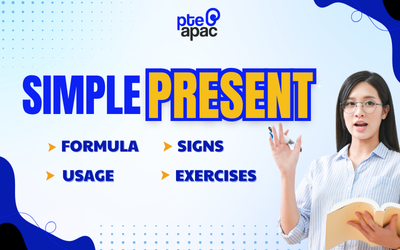Present Perfect Tense – Formula, Usage, Signals, and Exercises

199
The present perfect tense is one of the essential and frequently encountered tenses in English. Understanding and correctly using this tense not only helps you express actions and states more accurately but also lays a solid foundation for learning other tenses in English grammar. Let’s explore the present perfect tense in detail with PTE APAC, covering everything from the formula, usage, and signals to practice exercises for accurate and effective application.

1. What is the Present Perfect Tense?
The present perfect tense is used to describe actions that happened in the past, continue into the present, and may continue into the future.

2. Present Perfect Tense Formula
| Affirmative | Negative | Interrogative | Negative Interrogative |
| S + have/has + V3 (Past Participle) + O | S + have/has + not + V3 (Past Participle) + O | Have/Has + S + V3 (Past Participle)? + O | Have/has + S + not + V3 (Past Participle) + the rest of the sentence Haven’t / hasn’t + S + V3 (Past Participle) + the rest of the sentence |
| Examples: I have finished my work. | Examples: I have not finished my work. | Examples: Have you finished your work? | Examples: Haven’t you finished your work? |
- “S” (Subject) is the subject.
- “V” (Verb) is the verb.
- “O” (Object) is the object.
- “Have” is used with the subjects I, you, we, they.
- “Has” is used with the third-person singular subjects (he, she, it).
Examples:
- Affirmative: I have finished my homework.
- Negative: She has not seen this movie.
- Interrogative: Have you visited Paris?
Rules for Using the Present Perfect Tense
The first step in using the present perfect tense is understanding how to form past participles. Generally, in English, past participles are created by adding ‘ed’ to the base form of a verb. However, many irregular verbs have unique spellings and do not follow this ‘ed’ pattern. Reviewing a comprehensive list of irregular verbs will help you see how their past participle forms differ.
3. Uses of the Present Perfect Tense
- To describe an action that has been completed up to the present moment without mentioning when it happened:
- Example: I have finished my homework.
- Example: She has traveled to many countries.
- To describe actions that occurred in the past but have results affecting the present:
- Example: I can’t get into my house. I have lost my keys.
- To describe experiences or past events (often used with “ever” and “never”):
- Example: Have you ever been to Japan?
- Example: I have never eaten sushi.
- To describe actions that started in the past and continue to the present.
- Example: She has worked here for five years.
- Example: They have lived in this house since 2010.
- To describe actions that have just happened (often used with “just”):
- Example: I have just finished my lunch.
4. Signals of the Present Perfect Tense
Words or phrases often associated with the present perfect tense include:
- Just
- Example: She has just left.
- Already
- Example: They have already eaten.
- Yet (used in negative sentences and questions)
- Example: Have you finished your homework yet?
- Ever
- Example: Have you ever seen this film?
- Never
- Example: I have never been to London.
- For
- Example: We have known each other for 10 years.
- Since
- Example: He has lived here since 1999.

5. Distinguishing the Present Perfect from the Simple Past
- The present perfect emphasizes the result or effect of an action on the present.
- The simple past emphasizes the time when the action happened and was completed in the past.
Examples:
- Present Perfect: I have finished my work. – Emphasizes the result that the work is finished.
- Simple Past: I finished my work yesterday. – Emphasizes the time when the work was finished.
6. Practice Exercises for the Present Perfect Tense
Exercise 1: Complete the following sentences with the correct form of the verb in brackets.
- She __________ (read) three books this month.
- They __________ (not finish) their homework yet.
- I __________ (visit) Paris twice in my life.
- How many countries __________ you __________ (visit) so far?
- By the time I got there, she __________ (already leave).
- We __________ (never eat) at that restaurant before.
- He __________ (not arrive) at the party yet.
- Susan __________ (work) here since last year.
- __________ you ever __________ (see) a shooting star?
- They __________ (already buy) tickets for the concert.
Answers:
- has read
- have not finished
- have visited
- have; visited
- had already left
- have never eaten
- has not arrived
- has worked
- Have; seen
- have already bought
Exercise 2: Rearrange the words to form complete sentences using the present perfect tense.
- (I / never / visit / Japan)
- (She / live / in this city / since 2015)
- (They / already / see / that movie)
- (He / not / eat / lunch / yet)
- (We / just / arrive / at the airport)
- (She / work / here / for 5 years)
- (I / not / see / him / since last week)
- (We / buy / a new car)
- (She / not / finish / her assignment)
- (You / ever / ride / a horse)
Answers:
- I have never visited Japan.
- She has lived in this city since 2015.
- They have already seen that movie.
- He has not eaten lunch yet.
- We have just arrived at the airport.
- She has worked here for 5 years.
- I have not seen him since last week.
- We have bought a new car.
- She has not finished her assignment.
- Have you ever ridden a horse?
Exercise 3: Fill in the blanks with the correct form of the verb in brackets using the present perfect tense.
- I __________ (not see) her for a long time.
- She __________ (study) English for five years.
- They __________ (already finish) the project.
- How many books __________ you __________ (read) this year?
- By the time we arrived, they __________ (leave) the party.
- John __________ (not go) to Australia before.
- __________ you ever __________ (try) sushi?
- We __________ (live) in this house since 2010.
- She __________ (just start) her new job.
- __________ he __________ (ever meet) the president?
Answers:
- have not seen
- has studied
- have already finished
- have; read
- had left
- has not gone
- Have; tried
- have lived
- has just started
- Has; ever met
Exercise 4: Fill in the blanks with the correct form of the verb in brackets using the present perfect tense.
- She __________ (work) at this company for five years.
- __________ you ever __________ (visit) Europe?
- By the time we arrived, they __________ (already leave).
- How many languages __________ she __________ (learn) so far?
- He __________ (not finish) his assignment yet.
- __________ they __________ (read) that book before?
- We __________ (live) in this city since we were kids.
- __________ you __________ (ever see) a shooting star?
- Sarah __________ (just start) her new job.
- __________ he __________ (visit) the Grand Canyon?
Answers:
- has worked
- Have; visited
- had already left
- has; learned
- has not finished
- Have; read
- have lived
- Have; ever seen
- has just started
- Has; visited
Exercise 5: Complete the following sentences using the present perfect tense.
- She __________ (write) five emails since morning.
- __________ you ever __________ (see) a panda?
- By the time we got there, the movie __________ (already start).
- How many times __________ he __________ (travel) to Japan?
- They __________ (not decide) where to go for vacation yet.
- __________ she __________ (meet) the CEO yet?
- We __________ (live) in this neighborhood for ten years.
- __________ they __________ (finish) the project?
- I __________ (already eat) dinner.
- __________ you __________ (ever try) skydiving?
Answers:
- has written
- Have; seen
- had already started
- has; traveled
- have not decided
- Has; met
- have lived
- Have; finished
- have already eaten
- Have; ever tried
>>>For more: Simple Present Tense
Summary
The present perfect tense is a vital part of English grammar, enabling the expression of actions or states that began in the past and have relevance to the present. Mastering this tense not only enhances grammatical skills but also improves communication abilities in real-life situations. Practice regularly to become proficient and confident in using English!
In addition, PTE APAC offers a variety of courses, including PTE, business English, and English communication for working professionals. We focus on personalized learning through 1:1 online sessions, providing the most flexible and convenient learning experience. Register now to experience the professionalism and effectiveness of PTE APAC in developing your English skills!
ARTICLE CATEGORIES




